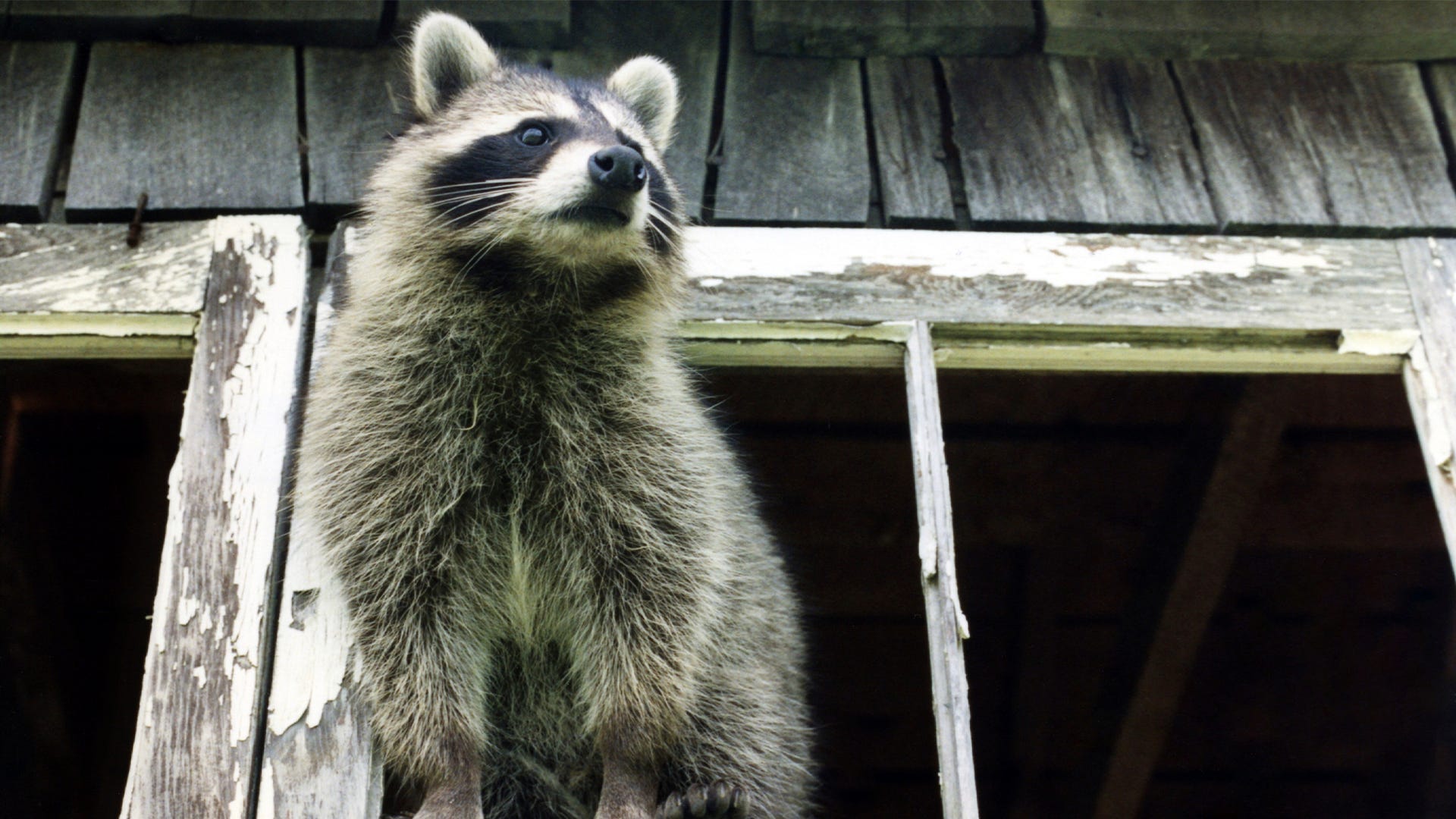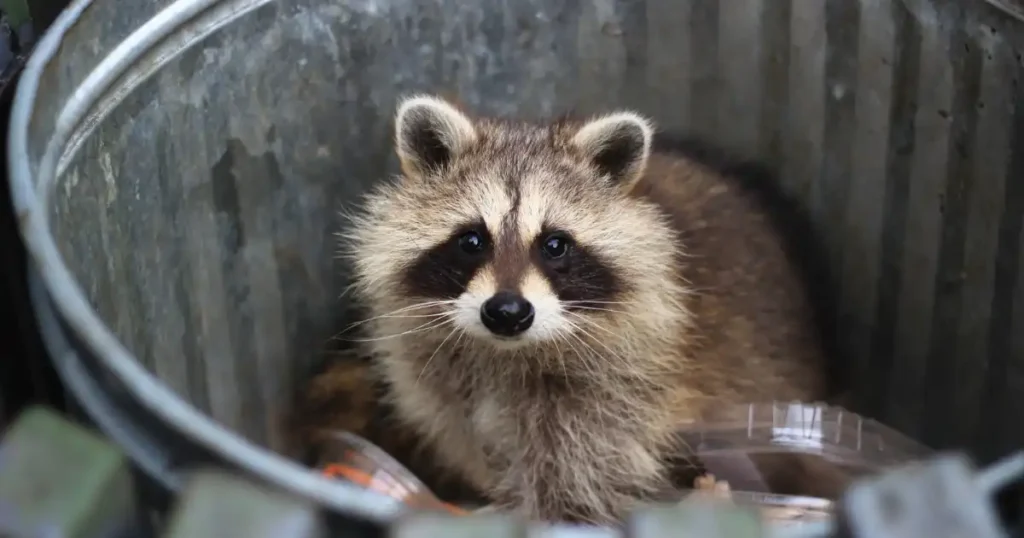To get raccoons out of your garage, remove food sources and secure garbage cans. Use motion-sensor lights to deter them.
Dealing with raccoons in your garage can be frustrating. These clever creatures are attracted to spaces that provide shelter and food. Often, they find their way into garages in search of pet food or garbage. The key to evicting these uninvited guests lies in making your garage less inviting.
Eliminating access to food plays a crucial role. Ensure that all pet food is stored in secure containers and trash cans are tightly sealed. Additionally, installing motion-sensor lights can scare raccoons away, as they prefer to forage in the dark. By following these steps, you can reclaim your space and prevent future invasions.
Identifying A Raccoon Invasion
Garages often become a shelter for raccoons. Recognizing an invasion is crucial. Learn how to spot raccoons early.
Signs Of Raccoon Presence
Raccoons leave clues. Look for these signs:
- Noises: Scratching, chattering, or thumping at night.
- Damage: Torn insulation, chewed wires, or disturbed items.
- Footprints: Look for tracks in dust or mud.
- Droppings: Feces near food sources or corners.
- Odor: Strong, musky smell lingers.
Risks Of Raccoon Encounters
Raccoons pose several risks:
| Risk | Details |
|---|---|
| Diseases | Rabies, roundworms, and other infections. |
| Bites or Scratches | They can become aggressive if cornered. |
| Property Damage | They can cause costly harm to structures. |
Safety First
Dealing with raccoons needs care. They can be aggressive. They carry diseases too. Wear the right gear. Know the health risks. Protect yourself always.
Protective Gear For Handling Raccoons
- Gloves: Thick, bite-proof gloves are a must.
- Long sleeves and pants: Protect skin from scratches.
- Boots: Sturdy boots prevent foot bites.
- Goggles: Keep raccoon saliva from eyes.
- Mask: A mask prevents disease transmission.
Health Concerns With Raccoons
| Disease | Transmission | Symptoms |
|---|---|---|
| Rabies | Bites or scratches | Fever, headache, excess salivation |
| Leptospirosis | Contact with urine | Muscle aches, jaundice, kidney damage |
| Roundworms | Ingesting eggs | Abdominal pain, tiredness, cough |
Pre-removal Preparations
Before removing raccoons from your garage, some steps are essential. These steps ensure raccoons leave safely and don’t return. Let’s prepare your garage together.
Securing Potential Food Sources
Raccoons love to eat. A garage can often offer them a feast. To make your garage less inviting, secure all food sources. Here’s how:
- Lock pet food in strong, sealed containers.
- Make sure garbage cans have tight-fitting lids.
- Remove any fruit or nuts that may have fallen in your yard.
Removing Attractants
Next, let’s remove what attracts raccoons to your garage. This includes:
- Water sources: Fix leaks and remove standing water.
- Shelter: Clear out piles of junk where raccoons can hide.
- Access points: Repair holes and secure garage windows and doors.
By following these steps, your garage will be less appealing to raccoons. They will look elsewhere for food, water, and shelter. With patience and persistence, you can keep your garage raccoon-free.

Credit: www.havahart.com
Humane Removal Techniques
Discovering raccoons in your garage can be a surprise. These clever critters may look cute, but they can cause chaos. Safely remove them with humane techniques. Keep your space critter-free and your conscience clear.
Using Live Traps
Live traps offer a kind way to catch and relocate raccoons. Follow these steps:
- Select a suitable size trap – Ensure it’s big enough for raccoons.
- Bait the trap – Use fruits, nuts, or marshmallows.
- Place it carefully – Set it near the raccoon’s entry point.
- Check it often – Don’t leave raccoons trapped for long.
- Relocate responsibly – Release them in a wild area far away.
Remember to wear gloves. Raccoons can carry diseases.
Natural Raccoon Repellents
Keep raccoons away naturally. Use smells and sounds they dislike:
- Ammonia – Soak rags and place them around the garage.
- Pepper sprays – Spray around entry points to irritate their senses.
- Ultrasonic repellents – Emit sounds to deter raccoons.
- Radio noise – Leave a radio on to mimic human presence.
Be consistent with these methods for best results.
Exclusion Strategies
Dealing with raccoons in your garage can be a challenge. These clever creatures find their way in, seeking shelter and food. The key to keeping them out is through effective exclusion strategies. Let’s explore some proven methods that help secure your garage from these unwelcome visitors.
Sealing Entry Points
Identify and seal all holes and gaps. Raccoons squeeze through small spaces to enter garages. Walk around your garage. Look for cracks, holes, and openings. Use sturdy materials like metal flashing, wire mesh, or concrete to block these entry points. Ensure vents have animal-proof covers. Check and fortify garage doors and windows.
Installing Motion-activated Lights
Raccoons dislike bright lights. They prefer dark areas to stay hidden. Install motion-activated lights to startle and deter them. Place these lights near entry points. The sudden light makes raccoons feel exposed. They will likely flee and avoid your garage.
Post-removal Cleaning
After you get raccoons out of your garage, cleaning is key. Post-Removal Cleaning makes sure your garage is safe and clean. Let’s dive into how to do it right.
Disinfecting The Area
First, you need to disinfect the whole garage. Raccoons leave germs. Use a mix of bleach and water. Wear gloves and a mask for safety. Spray the mix on floors and walls. Let it sit for 10 minutes. Then, clean it up with water.
Dealing With Raccoon Waste
Raccoon poop is not good for health. Wearing gloves is a must. Pick up the waste with a plastic bag. Seal it tight. Throw it in the trash. After, wash your hands well.
- Seal any holes to stop raccoons from coming back.
- Check the garage for any left raccoon food.
- Keep your garage door closed when not in use.
Legal Considerations
Legal Considerations are crucial when dealing with raccoons in your garage. These animals are protected by law. It’s important to handle the situation correctly. You must avoid illegal actions that could lead to fines or legal troubles. Understanding the laws and knowing when to call professionals will guide your actions.
Understanding Local Wildlife Laws
Local wildlife laws vary by location. These laws protect raccoons and dictate removal methods. Before acting, check your state’s wildlife regulations. Contact local authorities for guidance. This ensures your actions are legal. Fines or penalties can occur from illegal raccoon removal.
- Check your state’s wildlife agency website.
- Look for information on raccoon removal.
- Contact local authorities with questions.
When To Call Professionals
Professional wildlife removal services understand the laws. They safely and legally remove raccoons. If raccoons pose a danger or you’re unsure about laws, call professionals. They have the right tools and knowledge. This prevents harm to you and the animals. Ensure the service is licensed and experienced.
| Scenario | Action |
|---|---|
| Dangerous situation | Call professionals immediately |
| Unsure of laws | Seek professional advice |
| Lacking right tools | Do not attempt; call experts |

Credit: critterstop.com
Prevention Tips
Keeping raccoons out of your garage starts with prevention. A few key strategies can deter these clever critters from making themselves at home.
Maintaining A Clean Garage
Raccoons seek food and shelter. A dirty garage is an open invitation. Keep it tidy to avoid unwanted guests.
- Store trash in secure bins with lids.
- Keep pet food indoors.
- Clean spills immediately.
- Dispose of garbage regularly.
Regular Inspections For Vulnerabilities
Periodic checks keep raccoons out. Search for entry points they may use.
| Area | Action |
|---|---|
| Windows | Ensure they close properly. |
| Doors | Check for gaps or holes. |
| Roof | Look for loose shingles. |
| Foundation | Seal any cracks. |

Credit: crittercontrolftworth.com
Frequently Asked Questions
What Attracts Raccoons To Garages?
Raccoons are drawn to garages in search of food, water, and shelter. Easy access to garbage cans, pet food, or spilled birdseed can lure them in.
Can Raccoons Damage Property In Garages?
Yes, raccoons can cause significant damage by chewing wires, tearing insulation, and soiling areas with urine and feces.
How To Prevent Raccoons Entering The Garage?
Securing garbage cans, sealing entry points, and removing food sources can effectively deter raccoons from entering your garage.
Are There Humane Ways To Remove Raccoons?
Humane removal involves using live traps baited with food and safely relocating the raccoons to a suitable habitat away from residential areas.
Is Professional Raccoon Removal Necessary?
While DIY methods exist, professional removal ensures safe and legal handling of raccoons, particularly if there’s a persistent problem or risk of harm.
Conclusion
Dealing with raccoons can be challenging, but with the right approach, your garage can remain critter-free. Remember to secure trash, seal entry points, and consider professional help if needed. Keep these tips in mind, and you’ll say goodbye to unwanted garage guests for good.
Stay vigilant and maintain your defenses to keep those clever raccoons at bay.





